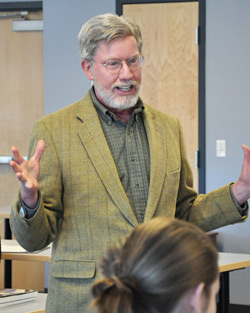
Scholar in Residence Dexter Burley Reflects on the Joys of Travel and Life as an Accidental Academic
After traveling the world, learning to be a landscape designer, and holding different teaching positions, Dexter Burley has settled down at Colby-Sawyer College as a Scholar in Residence in Social Sciences and Education. Professor Burley joined the faculty in 2008 after working as the executive director of Massachusetts General Hospital's Geriatric Medicine Unit and serving as a faculty member at Harvard University. Amber Cronin '11, a Communication Studies major who took and greatly enjoyed two courses in sociology with Professor Burley, interviewed him recently on campus.
Where did you earn your academic degrees?
I got my graduate degree from the University of New Hampshire. My family's farm is about 15 minutes from there, so it was the logical place to go. I studied at Marlboro College in Vermont for my undergraduate degree. The first time I went to Ethiopia was in 1964, after my freshman year, and then I went again in my junior year, but in between I took some time off from college. I dropped out and decided that I never wanted to go back to college again, and I worked with an architect because I thought I wanted to do architecture. Then I went back to college and in my junior year, I spent a little over a year in Ethiopia studying the language, the history and the culture.
Why did you decide to leave school?
I had a very good high school preparation and I was bored. I just didn't think that college was what I wanted to do; I wasn't stimulated enough and I wanted to be stimulated. I had always enjoyed design; I have a good special sense, and, in fact, after I retired I went back to school and studied landscape design and graduated. When I decided to go back to school for landscape design I was on the faculty at Harvard University so I became a student there as well. So eventually, after all of my career I was able to come back to something that I really enjoy.
How did you become interested in sociology?
Oh I wish it were a better story… My undergraduate majors were history and anthropology with a minor in the classics, and with those majors there were just no jobs. I was living in Boston and found a job at WGBH, so I worked there as a producer-in-training, and I ended up producing a show. Then I decided I really wanted to go back to school. So my family's farm is just outside of Durham and so I went to the University of New Hampshire and told them that I wanted to study anthropology, but they told me that they didn't have a Ph.D. program in anthropology, but they did have one in sociology so I said that I would do that. So it wasn't some passion that led me to study sociology; it was just happenstance and I find that's true in life. You know, you just bump into things.
Why did you go to Ethiopia the first time?
I was at a party and a friend said that she was going to Ethiopia with National Geographic and said, did I want to go, and I said sure. So often in life an opportunity comes up and I think it is important. I jumped into that opportunity.
Where did you start teaching?
I started teaching when I got my Ph.D. so I taught a course there [at the University of New Hampshire] and then I went back to Ethiopia again to do further research for my dissertation. At that point I was getting my Ph.D. in Sociology but I was also an expert in African Studies so when I applied for jobs I got some very interesting offers; one of them was the University of Illinois and a number of other places.
But at that point I was living with my wife and two babies in New Hampshire and one job offer came along from a college in Georgia. I had never been to Georgia so I went there. I couldn't believe it; it was February and here it was cold and freezing, but there the camellias were blooming, and I thought, What a wonderful place for my children to grow up. So I took that job and annoyed my advisors tremendously for not taking a more prestigious job. These were great years of my life and I think it was a great decision. So again, it was sort of happenstance.
How many countries have you been to?
A lot, I really don't know.
Where has been your favorite country to travel to?
That is so difficult. You know, there are some countries that I have been to that I don't like, which I won't tell you about, but then there are those that have something about them that is really exciting and compelling and make you want to go back, and I have gone back to most of the countries I have been to. In Thailand I love the food, the language and the people and the beaches are spectacular. But I also love the food and the people and the beaches in India and in Brazil and in Argentina. I don't have a favorite.
Why do you feel that it is important for people to travel?
Well, we all know that life is a gift, but I think it is through travel that we learn how to unwrap that gift. It's something that is so easy in our comfortable life, in our stimulating life here, to be intellectually complacent, intellectually and culturally complacent. It is through travel that you realize how precious our lives are and it stimulates us to explore that, the beauty of that.
Amber Cronin '11 is a Communication Studies major as well as a student writer for College Communications.



